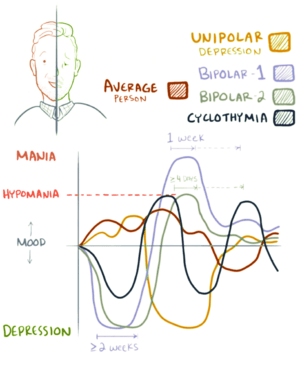Mood swing facts for kids
A mood swing is a quick change in how you feel. Imagine feeling super happy one minute, then a bit sad or annoyed the next. These shifts are a normal part of life for everyone. They can even help us think differently and solve problems. But sometimes, these mood changes can be very strong or happen too often, making it hard to manage daily life. When this happens, they might be a sign of a bipolar disorder or other mood conditions.

Contents
What are Mood Swings?
Mood swings are when your feelings change quickly and sometimes unexpectedly. One moment you might feel excited and full of energy, and the next you might feel tired or a little down. These changes are different for everyone. For some, they might be small shifts, like going from happy to slightly annoyed. For others, they can be big changes, like going from feeling very energetic to very sad.
Why Do Moods Change?
Many things can cause our moods to change. It's a normal part of being human!
- Everyday Events: Something exciting might happen, like getting a good grade, and you feel happy. Then, if you lose a game, you might feel disappointed.
- Stress: When you're feeling stressed about school, friends, or family, your mood can become more up and down.
- Sleep: Not getting enough sleep can make anyone feel grumpy or emotional.
- Hormones: As you grow, your body goes through many changes, especially during the teenage years. Hormones can play a big role in how your moods shift.
- Diet: What you eat can also affect your energy levels and mood. Eating healthy foods often helps keep your mood more stable.
When Mood Swings are a Problem
While some mood changes are normal, sometimes they can become very strong or happen so often that they cause problems.
- Difficulty in Daily Life: If your mood swings make it hard to focus in school, enjoy hobbies, or get along with friends and family, they might be more than just normal ups and downs.
- Extreme Feelings: If you feel extremely happy and energetic for days, then suddenly feel very sad and hopeless for a long time, it could be a sign of a mood disorder.
- Lasting a Long Time: Normal mood swings usually pass quickly. If a strong mood lasts for many days or weeks, it's a good idea to talk to a trusted adult.
How to Handle Strong Moods
If you or someone you know experiences very strong mood swings, there are ways to get help.
- Talk to an Adult: Share your feelings with a parent, teacher, school counselor, or another trusted adult. They can help you understand what's happening and find support.
- Healthy Habits: Eating well, getting enough sleep, and exercising can help balance your moods.
- Relaxation: Learning ways to relax, like deep breathing or listening to music, can help when moods feel overwhelming.
- Professional Help: Sometimes, talking to a doctor or a mental health professional (like a therapist) can be very helpful. They can offer strategies and support to manage mood swings.
See also
 In Spanish: Labilidad emocional para niños
In Spanish: Labilidad emocional para niños
 | Janet Taylor Pickett |
 | Synthia Saint James |
 | Howardena Pindell |
 | Faith Ringgold |

